Table of Contents
Come join us now, and enjoy playing your beloved music and browse through great scores of every level and styles!
Can’t find the songbook you’re looking for? Please, email us at: sheetmusiclibrarypdf@gmail.com We’d like to help you!
Sorabji: In the Hothouse (from Two Piano Pieces) sheet music, Noten, partitura, spartiti 楽譜

Best Sheet Music download from our Library.
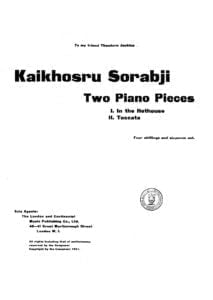
Please, subscribe to our Library.
If you are already a subscriber, please, check our NEW SCORES’ page every month for new sheet music. THANK YOU!
Browse in the Library:
Or browse in the categories menus & download the Library Catalog PDF:
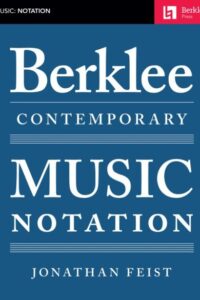
Who was Sorabji?
Kaikhosru Shapurji Sorabji: The Hermit of Modernist Maximalism
In the often-crowded pantheon of 20th-century composers, Kaikhosru Shapurji Sorabji (1892-1988) occupies a unique and enigmatic niche. A composer of staggering ambition, labyrinthine complexity, and self-imposed isolation, Sorabji crafted some of the most monumental, technically demanding, and stylistically idiosyncratic music ever conceived. His work, largely ignored during his lifetime and still challenging audiences today, represents a singular path through modernism – one defined by maximalism, intricate ornamentation, transcendental virtuosity, and a fierce, almost hermetic, independence.
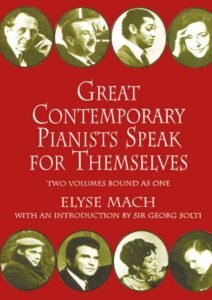
Biography: A Self-Forged Identity
- Birth & Heritage: Born Leon Dudley Sorabji on August 14, 1892, in Chingford, Essex, England. His father was a Parsi engineer from India (thus the Persian-derived name Sorabji), and his mother was English-Spanish. This mixed heritage profoundly shaped his sense of identity, though he felt alienated from both cultures.
- The Name: Around 1914, he legally changed his name to Kaikhosru Shapurji Sorabji. “Kaikhosru” and “Shapurji” were Persian names chosen for their resonance and connection to ancient Persian history and Zoroastrianism, reflecting his deliberate construction of a unique persona.
- Musical Formation: Largely self-taught. He received some piano lessons in his youth but had no formal composition training. His musical education came through voracious listening, score study (especially Bach, Liszt, Busoni, Debussy, Ravel, Scriabin, Szymanowski, Medtner), and wide reading in literature, philosophy, and the occult.
- Early Career & Criticism: Worked as a music critic (under the pseudonym “S. Godfrey”) for outlets like The New Age and The New English Weekly from the 1910s to the 1930s. His critiques were famously acerbic, insightful, and often scathing, particularly targeting English musical provincialism and composers he deemed mediocre (which was most of them).
- The Recluse: Deeply disillusioned by the musical establishment and critical reception to his early performances (which were rare and often controversial), Sorabji gradually withdrew from public musical life starting in the late 1930s. After his mother’s death in 1940, he retreated almost completely to his secluded home “The Eye” in Corfe Castle, Dorset, where he lived with his companion, Reginald Norman Best, until his death. He forbade performances of his music for decades.
- The Ban Lifted: In 1976, pressured by a growing underground interest spearheaded by pianists like Yonty Solomon and Alistair Hinton (who later became his literary executor), Sorabji reluctantly lifted the ban on performances, provided he approved the performer.
- Death: Sorabji died on October 15, 1988, in Winfrith Newburgh, Dorset, leaving behind a colossal legacy of unpublished manuscripts.
Works: Monuments of Sound

Sorabji’s output is vast and overwhelmingly dominated by solo piano music, though he also composed orchestral works, chamber music, organ symphonies, and songs. His works are renowned for their extreme length, density, and technical difficulty, pushing the boundaries of playability.
- Key Masterpieces:
- Opus Clavicembalisticum (1930): His most famous (or infamous) work. A colossal 4+ hour piano epic in 12 movements (including fugues, passacaglias, toccatas, cadenzas), often considered one of the most challenging solo piano works ever written. A summit of contrapuntal complexity and virtuosic display.
- Symphonic Variations for Piano (1935-37): Another monumental work, exploring vast variation forms over an extended duration.
- Sequentia Cyclica super “Dies iræ” ex Missa pro Defunctis (1948-49): A massive cycle of 27 variations on the “Dies Irae” chant, demonstrating his intricate contrapuntal and transformative skills.
- 100 Transcendental Studies (1940-44): True to their name, these studies explore extreme technical and expressive demands far beyond those of Liszt or Chopin.
- Symphonies for Solo Piano: Several exist, including his Symphony No. 2 (“Jāmī”), blending orchestral textures and scope onto the piano.
- Gulistān – Nocturne for Piano (1940): A prime example of his lush, perfumed, and incredibly intricate “Persian”-inspired style.
- Concerti: He wrote several for solo piano and orchestra (e.g., Concerto per suonare da me solo e senza orchestra, per divertirsi), which are symphonic in scale and require superhuman virtuosity.
- Symphonies for Organ: Vast, complex works exploring the sonic possibilities of the instrument.
Analysis of Style: A Universe of Complexity
Sorabji’s style is instantly recognizable yet difficult to categorize. It synthesizes diverse elements into a unique and overwhelming whole:
- Maximalism: This is the defining characteristic. Sorabji embraced extremes:
- Length: Works lasting several hours are common.
- Density: Highly polyphonic textures, often with multiple independent melodic lines woven together in complex counterpoint (influenced by Bach, Busoni).
- Virtuosity: Demands transcendental technique – cascades of notes, complex polyrhythms, wide leaps, immense power, and extreme delicacy. He wrote as if the pianist had four hands.
- Ornamentation: Baroque-like ornamentation (trills, mordents, turns, grace notes) is ubiquitous, often layered and integral to the texture, creating shimmering, kaleidoscopic surfaces (influenced by Scriabin, Szymanowski, Middle Eastern/Persian music).
- Dynamic Range: From barely audible whispers to thunderous, percussive climaxes.
- Harmony: A complex fusion:
- Rooted in late-Romantic chromaticism (Scriabin, Szymanowski, early Schoenberg).
- Freely employed dissonance, clusters, and intricate chord structures.
- Often retained a sense of tonal centers or polarity, even amidst dense chromaticism (unlike strict atonality).
- Incorporated modal inflections, sometimes evoking Persian or Spanish flavors.
- Rhythm: Highly complex and fluid:
- Frequent use of polyrhythms (multiple simultaneous rhythms), cross-rhythms, and nested tuplets (triplets within quintuplets, etc.).
- Tempo often fluctuates wildly, requiring immense control.
- A sense of improvisatory freedom within highly structured forms.
- Form: Often large-scale, complex, and idiosyncratic:
- Favored variations (passacaglias, chaconnes), fugues, toccatas, and intricate multi-movement structures (like the Opus Clavicembalisticum).
- Forms were often expansive and cumulative, building through layered repetition and intensification rather than traditional development.
- Architecture was paramount, even in the densest textures.
- Influences (Assimilated, Not Imitated):
- Ferruccio Busoni: The most profound influence. Busoni’s ideas of “Young Classicism,” the transcendental potential of the piano, the fusion of Bachian counterpoint with modern harmony, and the concept of “Junge Klassizität” resonated deeply. Sorabji dedicated his Opus Clavicembalisticum to Busoni’s memory.
- Franz Liszt: Virtuosity, thematic transformation, large-scale forms, and the symphonic poem concept translated to piano.
- J.S. Bach: Contrapuntal mastery, structural rigor, and the use of forms like fugue and passacaglia.
- Alexander Scriabin: Mysticism, harmonic language, dense textures, and ecstatic climaxes.
- Karol Szymanowski: Sensuous harmony, intricate ornamentation (especially in the “Persian” inspired works like Métopes and Masques), and voluptuous textures.
- Debussy & Ravel: Color, texture, exoticism, and pianistic refinement.
- Mediterranean & Persian Cultures: While not authentically recreating these styles, he evoked their essence through ornamentation, melodic turns, and titles (Gulistān, Jāmī), reflecting his fascination with his Persian heritage and the wider Orient.
- Aesthetic: Sorabji’s music aimed for:
- Transcendence: Pushing beyond perceived limits of instrument, performer, and listener.
- Luxuriance & Opulence: A rich, sensual, almost decadent sound world.
- Intellectual Rigor: Underlying the sensual surface was meticulous structural planning.
- Individualism: A complete rejection of prevailing trends (serialism, neoclassicism, minimalism) in favor of his own uncompromising vision.
Legacy: From Obscurity to Cult Status
Sorabji’s legacy is complex and evolving:
- Decades of Neglect: His self-imposed exile and performance ban meant his music was virtually unknown outside a tiny circle for nearly 40 years. Manuscripts were inaccessible, unplayable, and unpublished.
- The Pioneers (1970s-): The lifting of the ban sparked interest. Pianists like Yonty Solomon, Michael Habermann, Geoffrey Douglas Madge (who made the first complete recording of Opus Clavicembalisticum in 1977), and later Marc-André Hamelin, Jonathan Powell, Fredrik Ullén, and Ronald Stevenson began the monumental task of learning, performing, and recording his works. This required immense dedication and technical prowess.
- Publication & Scholarship: The Sorabji Archive, established by Alistair Hinton (Sorabji’s literary executor), has been crucial in cataloging, editing, and facilitating the publication of scores (primarily by Dover Publications and The Sorabji Music Archive). Scholarly work is gradually increasing.
- Recordings Renaissance: The CD era and digital distribution (YouTube, streaming) have been transformative. Dedicated labels (Altarus, BIS, Toccata Classics, Piano Classics) have released numerous recordings, making this once-inaccessible music available globally. Complete cycles of the 100 Studies and other major works are underway.
- The Cult & The Challenge: Sorabji remains a “composer’s composer” and a cult figure. His music is not mainstream concert fare due to its extreme demands and duration. However, it commands deep respect and fascination among pianists, composers, and listeners drawn to its unique sound world and uncompromising vision. He is seen as the ultimate iconoclast, forging a path utterly independent of 20th-century musical fashions.
- Influence: His direct influence on other composers is hard to pinpoint due to his obscurity, but he stands as a powerful symbol of uncompromising artistic integrity and the exploration of extreme complexity and virtuosity. Composers interested in maximalism, intricate counterpoint, or pushing pianistic limits inevitably encounter his shadow.
- Copyright Controversy: The complex copyright status of his works (involving the Sorabji Archive and publishers) has sometimes been a point of friction within the community of performers and scholars seeking access.
Sorabji: The Solitary Giant
Kaikhosru Shapurji Sorabji was a true original. He inhabited a musical universe entirely of his own making, synthesizing diverse influences into a style characterized by unparalleled complexity, sensuous opulence, and transcendental ambition. His deliberate withdrawal from the world ensured decades of obscurity, but the dedication of pioneering performers and the power of recording technology have brought his extraordinary soundscapes to light. While his music remains challenging and demanding, it offers unparalleled rewards: a journey into a world of labyrinthine beauty, overwhelming power, and intellectual fascination. Sorabji stands as a testament to the power of an utterly individual artistic vision, uncompromising in its scope and ambition, a solitary giant whose monumental creations continue to challenge and inspire. He redefined the possible for the piano and left a legacy that continues to unfold as more performers dare to scale his musical Himalayas.
“In the Hothouse” is one of Sorabji’s most evocative and frequently performed works, serving as a perfect entry point into his dense, sensuous sound world. Here’s a detailed look at this fascinating piece:
Context: Two Piano Pieces (1918)
- Composed: 1918 (early in Sorabji’s career, age 26).
- Publication: First published in 1920, making it one of the earliest Sorabji works available in print.
- The Pair: “In the Hothouse” is paired with “Toccata” – a contrasting, hyper-virtuosic, and structurally complex piece showing his Busoni/Liszt influences. “In the Hothouse” offers the sensual, atmospheric counterpoint.
- Significance: Represents Sorabji’s early mastery of texture, harmony, and evocative atmosphere. It predates his gargantuan works but already displays his unique voice.
“In the Hothouse”: A Sensory Immersion
- Title & Imagery: The title instantly conjures an environment: humid, lush, teeming with exotic, overripe plant life, heavy perfumes, and stifling, enclosed heat. Sorabji translates this sensory overload into sound.
- Form & Structure: Relatively free and rhapsodic. It unfolds as a continuous, organic stream of consciousness rather than adhering to strict classical forms. Think of it as an elaborate, decadent arabesque.
- Style & Character:
- Extreme Sensuality: This is the defining feature. The music drips with lush, complex harmonies and suffocatingly rich textures.
- Harmony: Deeply chromatic, rooted in late Scriabin and early Szymanowski. Expect dense, constantly shifting chords: augmented harmonies, whole-tone inflections, unresolved dissonances creating tension, and sudden moments of surprising consonance like shafts of light piercing foliage. It avoids traditional tonality but gravitates around implied centers.
- Texture: Thick, layered, and constantly in motion. Tremolos, trills, rapid filigree (ornamental passages), and cascading arpeggios create a shimmering, humid haze. Melodies are often embedded within this dense undergrowth rather than standing clearly apart. The writing often requires the pianist to sustain multiple layers simultaneously.
- Rhythm: Fluid and flexible, often obscured by the sheer density of notes and ornamentation. Rubato (expressive tempo fluctuations) is essential. While less overtly complex polyrhythmically than his later works, the rhythmic flow feels organic and improvisatory.
- Dynamics & Articulation: Wide dynamic range, often shifting suddenly between extremes (e.g., thunderous climaxes collapsing into fragile whispers). Articulation varies from sharp staccatos to legatissimo passages that blur together. Pedaling is crucial for sustaining the harmonic haze and creating resonance.
- Ornamentation: Quintessential early Sorabji. Trills, mordents, turns, and grace notes are not mere decoration; they are the texture, creating constant flickering movement and contributing to the claustrophobic, teeming atmosphere. This foreshadows the intricate ornamentation dominating his mature style.
- Emotional Landscape: Evokes opulence, decadence, languor, mystery, stifling heat, hidden dangers, and overwhelming sensory stimulation. There’s a sense of beauty bordering on the grotesque due to its sheer intensity.
Influences Audible in “In the Hothouse”
- Scriabin (Primary): The harmonic language (mystic chords, unresolved dissonance, ecstatic climaxes), the sensual atmosphere, and the use of trills/tremolos are deeply indebted to Scriabin’s late sonatas and poems (e.g., Vers la flamme). Sorabji pushes Scriabin’s decadence further.
- Szymanowski: The opulent textures, perfumed harmonies, and “orientalist” exoticism (though abstracted here) strongly recall Szymanowski’s “Métopes” or “Masques,” which Sorabji admired deeply.
- Debussy: The focus on atmosphere, texture, and harmonic color (whole-tone scales, parallel chords) shows Debussy’s influence, though rendered with far greater density and intensity.
- Ravel: The virtuosic filigree and lush harmonies (think “Gaspard de la Nuit,” especially “Ondine” or “Le gibet”) are a touchstone, again amplified.
- Liszt: The rhapsodic freedom and dramatic gestures hint at Liszt, though filtered through a post-Scriabinesque lens.
Performance Challenges
- Texture & Balance: Maintaining clarity amidst the dense, rapidly shifting textures is paramount. The pianist must carefully voice chords and layers to prevent muddiness while sustaining the essential harmonic haze.
- Ornamentation as Texture: Executing the constant ornamentation smoothly and evenly, integrating it into the melodic and harmonic flow rather than treating it as mere decoration.
- Dynamic Control: Navigating the extreme dynamic contrasts and sudden shifts without sounding jarring. Creating a true pianissimo shimmer within complexity is incredibly difficult.
- Rubato & Phrasing: Applying expressive tempo fluctuations naturally while maintaining the overall structural coherence and forward momentum of the rhapsodic form.
- Pedaling: Using the pedal to create resonance and blend without causing harmonic blurring or loss of rhythmic definition. Requires exceptional sensitivity.
- Stamina & Focus: While shorter than his later works (typically 12-15 minutes), the piece demands intense concentration and physical control to sustain the atmosphere and navigate the technical intricacies.
Legacy & Significance of “In the Hothouse”
- Accessibility: It remains one of Sorabji’s most “accessible” works due to its evocative title, relatively shorter duration, and concentrated expression. It’s a frequent choice for pianists introducing audiences to Sorabji.
- Blueprint: It serves as a crucial blueprint for Sorabji’s mature style, showcasing his core preoccupations: sensuality, harmonic density, intricate ornamentation as texture, and atmospheric evocation, all present in embryonic form.
- Performance History: Despite Sorabji’s later ban, “In the Hothouse” (along with the Toccata) was one of the few pieces occasionally performed during his lifetime (e.g., by Sorabji himself and pianist Reginald Paul) and became a key work for the pioneering generation post-1976 (Yonty Solomon, Michael Habermann, Marc-André Hamelin, Jonathan Powell, Fredrik Ullén).
- Gateway Piece: It functions as a vital “gateway drug” into Sorabji’s world. Its success in conveying its intense atmosphere often encourages listeners to explore his more monumental, complex works.
- Standalone Masterpiece: Regardless of its role as an introduction, it stands as a perfectly formed and powerful piece of early modernist piano writing, a miniature tone poem of extraordinary evocative power.
“In the Hothouse” is a sun-drenched, overripe, and intoxicating immersion into Sorabji’s unique aesthetic. It captures the essence of his sensual maximalism in a concentrated dose, showcasing his debt to Scriabin and Szymanowski while asserting his own distinct voice. Its evocative power, technical brilliance, and relative brevity ensure its enduring place as one of his most beloved and frequently performed works, offering a compelling glimpse into the hothouse of Sorabji’s extraordinary musical imagination.
| Artist or Composer / Score name | Cover | List of Contents |
|---|---|---|
| Christmas Favorites Book 1 Helen Marlais In Recital With (Early Elementary) |
 |
Christmas Favorites Book 1 Helen Marlais In Recital With (Early Elementary) |
| Christmas Favorites Book 2 Helen Marlais In Recital With (Elementary) |
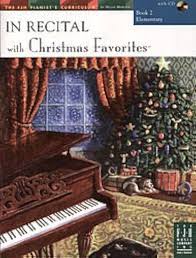 |
Christmas Favorites Book 2 Helen Marlais In Recital With (Elementary) |
| Christmas Favorites Book 3 Helen Marlais In Recital With (Late Elementary) |
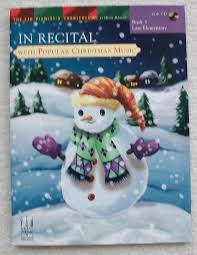 |
Christmas Favorites Book 3 Helen Marlais In Recital With (Late Elementary) |
| Christmas Favorites Book 4 Helen Marlais In Recital With (Early Intermediate |
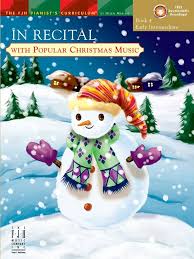 |
Christmas Favorites Book 4 Helen Marlais In Recital With (Early Intermediate |
| Christmas Guitar Solos arr. for Intermadiate guitar with TABs by Edward Wright |
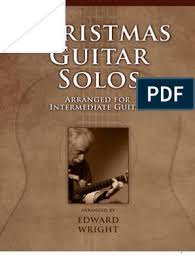 |
Christmas Guitar Solos arr. for Intermediate guitar with TABs by Edward Wright |
| Christmas Hits Easy Guitar With Notes Tab |
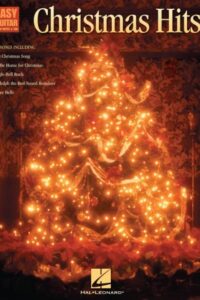 |
Christmas Hits Easy Guitar With Notes Tab |
| Christmas Hits Singer Piano Guitar 31 Songs |
 |
Christmas Hits Singer Piano Guitar 31 Songs |
| Christmas In Recital by Helen Marlais Popular Christmas For The Advancing Pianist |
 |
Christmas In Recital by Helen Marlais Popular Christmas For The Advancing Pianist |
| Christmas Jazz (Carol of the Bells, Jingle Bells, We wish you a Merry Christmas) (arr. by Kirby Shaw) |
 |
Christmas Jazz |
| Christmas Jazz Cafe by Jacob Koller Piano and guitar Chords songbook |
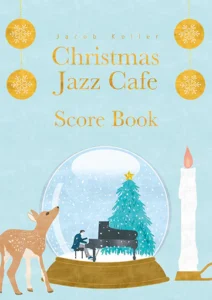 |
Christmas Jazz Cafe by Jacob Koller Piano and guitar Chords songbook |
| Christmas Jazz Duets Book Jazz Tutorial Christmas Song Collection |
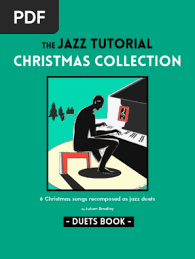 |
Christmas Jazz Duets Book Jazz Tutorial Christmas Song Collection |
| Christmas Jazz For Piano |
 |
Christmas Jazz For Piano |
| Christmas Jazz It Up! Christmas – 2nd Edition12 traditional Christmas favorites by Eric Baumgartner |
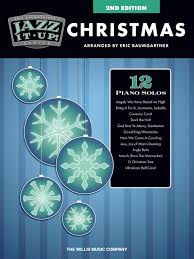 |
Christmas Jazz It Up! Christmas – 2nd Edition12 traditional Christmas favorites by Eric Baumgartner |
| Christmas Jazz It Up! Christmas – Six Traditional Carols for the Mid-Intermediater Pianist by Eric Baumgartner |
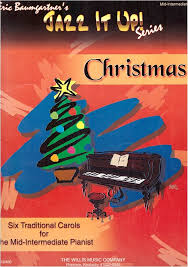 |
Christmas Jazz It Up! |
| Christmas Medley Special Kyle Landry |
 |
|
| Christmas Medleys for Piano Solo by Jason Lyle Black |
 |
Christmas Medleys for Piano Solo by Jason Lyle Black |
| Christmas Meets Jazz 15 Famous Christmas Songs For Piano |
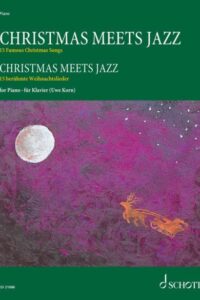 |
Christmas Meets Jazz 15 Famous Christmas Songs For Piano |
| Christmas Mellow Seasonal Favorites for Piano, A Smooth Jazz (Roger House) |
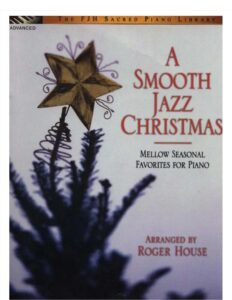 |
Christmas Mellow Seasonal Favorites for Piano, A Smooth Jazz (Roger House) |
| Christmas Motets (Choral Classics) Edited by John Rutter |
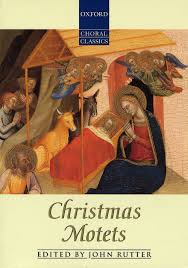 |
Christmas Motets (Choral Classics) Edited by John Rutter |
| Christmas Piano Solos John Thompsons Modern Course For The Piano |
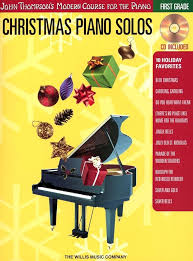 |
Christmas Piano Solos John Thompsons Modern Course For The Piano |
| Christmas Pop Favorites For Piano Solo Intermediate To Advanced Level |
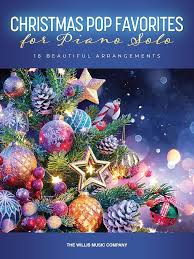 |
Christmas Pop Favorites For Piano Solo Intermediate To Advanced Level |
| Christmas Presence. Sound Of The Season |
 |
Christmas Presence. Sound Of The Season |
| Christmas Professional Singers Christmas Fake Book 120 songs |
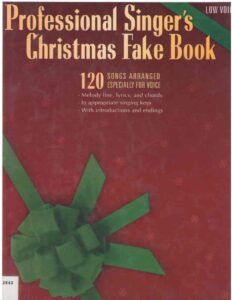 |
Christmas Professional Singers Christmas Fake Book 120 songs |
| Christmas Recital For Piano |
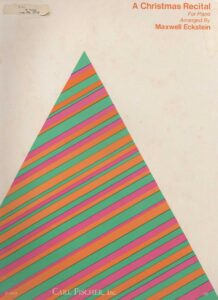 |
Christmas Recital For Piano |
| Christmas Song For Play In First-Class Restaurant Piano Solo |
 |
Christmas Song For Play In First-Class Restaurant Piano Solo |
| Christmas Song, The – Mel Tormé & Wells Bob Merry Christmas to You Easy Piano Solo.mscz | ||
| Christmas Song, The – Mel Tormé & Wells Bob Merry Christmas to You Easy Piano Solo |
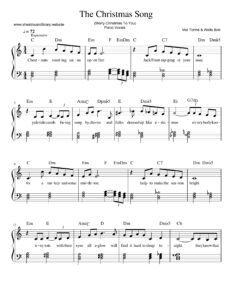 |
|
| Christmas Songbook The Readers Digest Merry Christmas Songbook (William L. Simon, Dan Fox) Vintage sheet music |
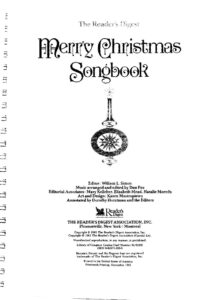 |
Christmas Songbook The Readers Digest Merry Christmas Songbook (William L. Simon, Dan Fox) |
| Christmas Songs All Jazzed Up |
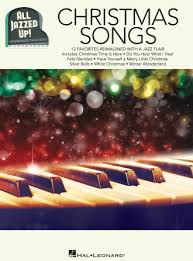 |
Christmas Songs All Jazzed Up |
| Christmas Songs for guitar arr. by Jim Giddings |
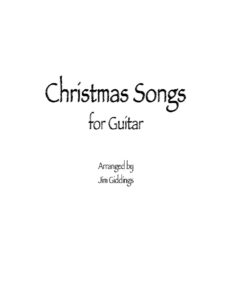 |
Christmas Songs for guitar arr. by Jim Giddings |
| Christmas Songs Jazz Piano Solos Series Volume 25 |
 |
Christmas Songs Jazz Piano Solos Series Volume 25 |
| Christmas Songs Piano Vocal guitar Chords |
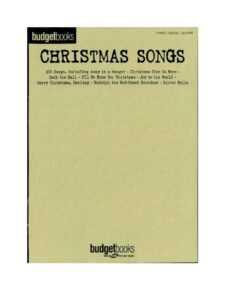 |
Christmas Songs Piano Vocal guitar Chords |
| Christmas Standards Jazz Guitar Chord Melody Solos |
 |
Christmas Standards Jazz Guitar Chord Melody Solos |
| Christmas The Best Christmas Songs Ever 5th Edition Easy Piano Piano Vocal Guitar Chords |
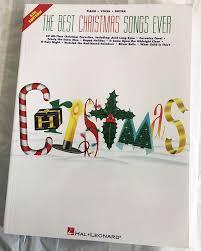 |
The Best Christmas Songs Ever 5th Edition Easy Piano Piano Vocal Guitar Chords |
| Christmas The Definitive Christmas Collection 3rd Edition Piano Vocal Guitar |
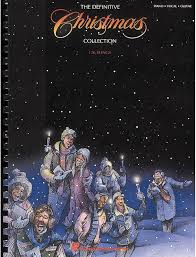 |
Christmas The Definitive Christmas Collection 3rd Edition Piano Vocal Guitar_compressed |
| Christmas The Giant Book Of Christmas For Piano Sheet Music Top Requested 60 Best Songs Piano Vocal |
 |
Christmas The Giant Book Of Christmas For Piano Sheet Music Top Requested 60 Best Songs |
| CHRISTOPHE – Compilation |
 |
CHRISTOPHE – Compilation |
| CHRISTOPHER CROSS – Songbook |
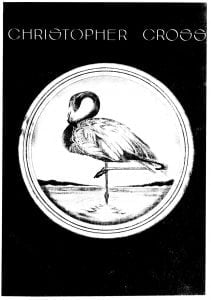 |
CHRISTOPHER CROSS – Songbook |
| Christopher Cross – Arthur’s theme | Christopher Cross – Arthurs Theme | |
| Christopher Cross – Arthurs Theme | ||
| Christopher Cross – Sailing (Piano vocal guitar chords) | Christopher-Cross-Sailing 1st page | |
| Christopher Fisher Valse Melancolique Piano |
 |
|
| Christopher Gunning Poirot Piano Solo | Christopher Gunning Poirot Piano Solo | |
| Christopher Norton – MicroJazz More MicroJazz Microstyles (Full Collection – Piano) 165 pages | Christopher Norton – MicroJazz, More MicroJazz, Microstyles (Piano) | |
| Christopher Norton – Microjazz for Guitar Duet |
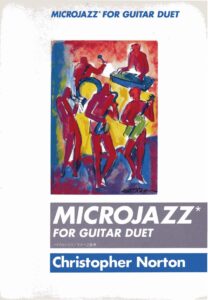 |
|
| Christopher Norton – Microjazz for Guitar Solo |
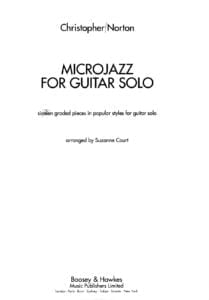 |
Christopher Norton – Microjazz for Guitar Solo |
| Christopher Norton – MicroJazz for Starters |
 |
|
| Christopher Norton – MicroJazz I |
 |
|
| Christopher Norton – MicroJazz II |
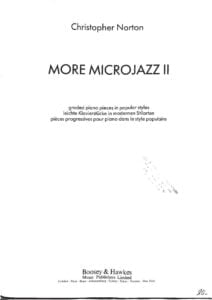 |
|
| Christopher Norton – Microstyles 1 for Keyboard (Jazz Piano) |
 |
Christopher Norton – Microstyles For Keyboard Vol 1 |
| Christopher Norton – Microstyles 2 for Keyboard (Jazz Piano) |
 |
|
| Christopher Norton – Microstyles 3 for Keyboard (Jazz Piano) |
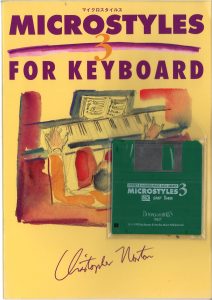 |
|
| Christopher Norton – Microstyles 4 for Keyboard (Jazz Piano) |
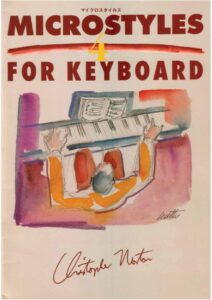 |
|
| Christopher Norton – More MicroJazz I |
 |
|
| Christopher Norton – More MicroJazz II |
 |
|
| Christopher Norton Connections for piano 1 with MP3 audio background tracks to play along |
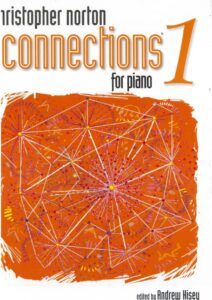 |
Christopher Norton Connections for piano 1 |
| Christopher Norton Down to Business Microjazz for starters.mscz | ||
| Christopher Norton MicroJazz 2 for Guitar solo |
 |
|
| Christopher Norton MicroJazz duets collection 1 |
 |
|
| Christopher Norton MicroJazz duets collection 2 |
 |
|
| Christopher Young – Concerto To Hell (Intro) | Christopher Young – Concerto To Hell | |
| Christopher Young – Kill With Me (Untraceable) | Christopher Young – Kill With Me (Untraceable) | |
| Christopher Young – Missing Flowers (Untraceable) |
 |
|
| Christopher Young – Untraceable – Kill With Me (Piano solo sheet music) |
 |
|
| Christopher Young Resurrection (Hellraiser) Piano solo |
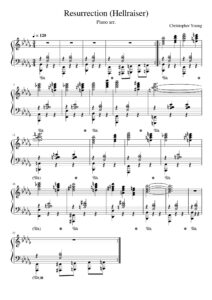 |
|
| Chronicles of Narnia The Battle (Piano) | Chronicles of Narnia The Battle (Piano) | |
| Chrono Cross The Scars Of Time (Game) music by Yasumori Mitsuda |
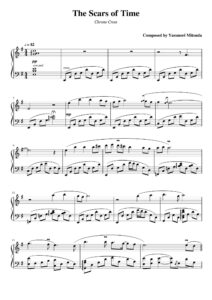 |
|
| Chrono Cross On The Shores Of Another World Piano Solo Theme |
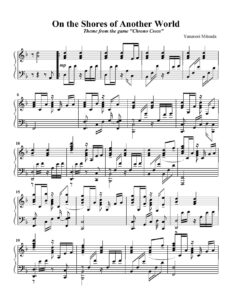 |
|
| Chrono Cross Original Soundtrack Sheet Music (Mitsuda Yasunori) |
 |
Chrono Cross Original Soundtrack Sheet Music (Mitsuda Yasunori) |
| Chuan C Chang Fundamentals of piano practice and Piano Tuning |
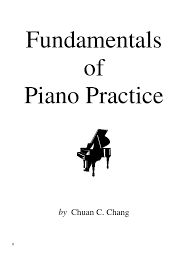 |
|
| Chuan C Chang Fundamentos estudio piano (Spanish) | Book Theory | |
| Chucho Valdés – Claudia as played by Arturo Sandoval (solo) |
 |
|
| Chuck Berry In Session with – with MP3 audio backing tracks |
 |
Chuck Berry In Session with – with MP3 audio macking tracks sheet music pdf |
| Chuck Berry – Brown Eyed Handsome Man The Life and Hard Times of Chuck Berry (Bruce Pegg) |
 |
|
| Chuck Berry – Solid Gold Rock & Roll |
 |
Chuck Berry – Solid Gold Rock & Roll |
| Chuck Berry – You Never Can Tell | ||
| Chuck Berry Guitar Recorded Versions Tablature songbook |
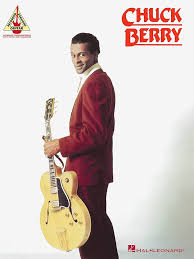 |
Chuck Berry Guitar Recorded Versions Tablature |
| Chuck Mangione Feels So Good |
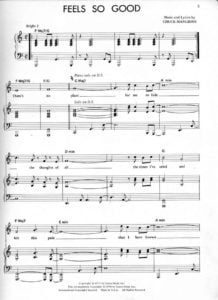 |
|
| Chugunov – Jazz pieces for piano 1990 | Chugunov – Jazz pieces for piano 1990 | |
| Ciao Ninin (Fabio Concato) | ||
| Cimarosa -Sonate-03 |
 |
|
| Cimarosa -Sonate-04 |
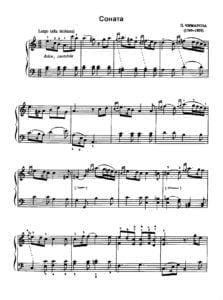 |
|
| Cimarosa -Sonate-11 |
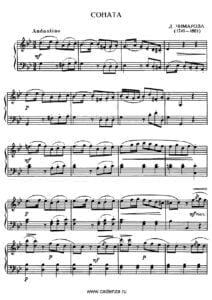 |
|
| Cimarosa Sonatas 1 |
 |
|
| Cimarosa Sonatas 2 |
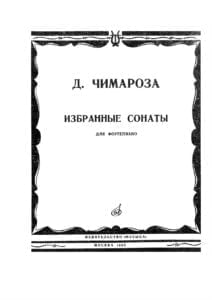 |
|
| Cinderella A Dream Is A Wish Your Heart Makes Piano solo Sheet Music |
 |
|
| Cinderella Songbook – Patrick Doyle |
 |
Cinderella Songbook – Patrick Doyle |
| Cinema Paradiso Ennio Morricone (Musescore File).mscz | ||
| Cinema Paradiso Love Theme (Musescore File).mscz | ||
| Cinema Paradiso Love Theme Andrea Morricone & Ennio Morricone |
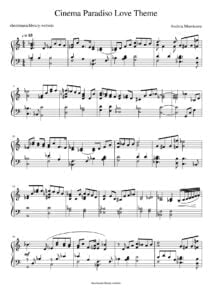 |
|
| City Of Angels The Musical Piano Vocal By Cy Coleman And David Zippel |
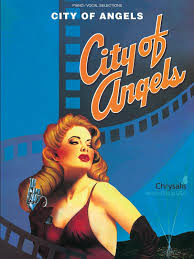 |
City Of Angels The Musical Piano Vocal By Cy Coleman And David Zippel |
| City of Stars – La La Land OST (Ryan Gosling & Emma Stone) | ||
| City of Stars -La La Land Justin Hurwitz with embedded piano lesson (easy) | City of Stars -La La Land Justin Hurwitz | |
| City Of Stars (La La Land) Easy Piano |
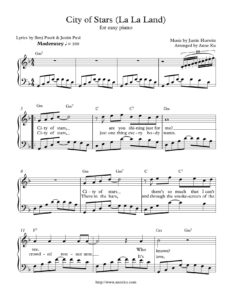 |
|
| City Of Stars (Musescore File).mscz | ||
| City of Stars from the Movie La La Land – Piano Solo |
 |
|
| City of Stars from the Movie La La Land (Piano Solo) |
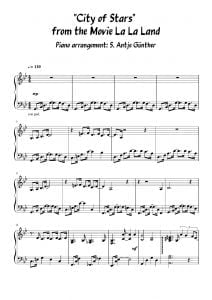 |
|
| Cityscape (Musescore File).mscz | ||
| Cityscape Mike Brecker Solo (Complete) |
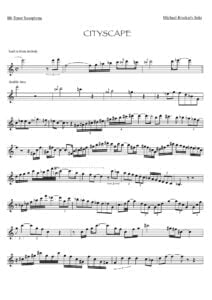 |
|
| Civil War Piano Vocal Score by Gregory Boyd and Frank Wildhorn, with lyrics by Jack Murphy |
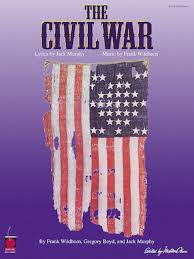 |
Civil War Piano Vocal Score by Gregory Boyd and Frank Wildhorn, with lyrics by Jack Murphy |
| Claire – Sage Femme OST (Grégoire Hetzel) | ||
| Clara Schumann Piano Music |
 |
Clara Schumann Piano Music |
| Clare Fischer – Harmonic Exercises For Piano |
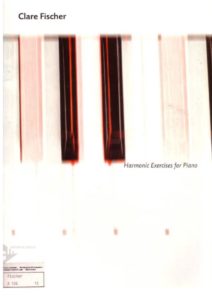 |
|
| Clare Fischer Morning |
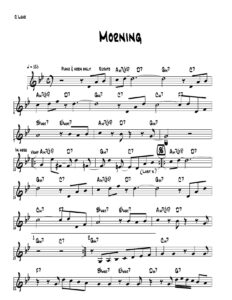 |
|
| Clare Fischer Pensativa Blakey Jazz Messengers Arr. |
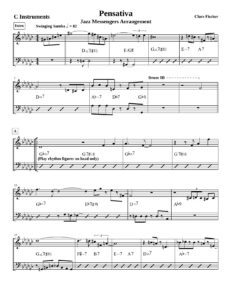 |
|
| Clarence White Guitar with Tablature |
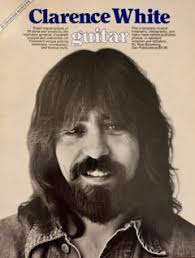 |
Clarence White Guitar with Tablature |
| Clarinet Concerto In A K622 (Adagio) (Musescore File).mscz | ||
| Clarinet John Davies & Paul Harris – The Really Easy Clarinet Book, very first solos for Bb clarinet with piano accompaniment |
 |
|
| Clarinet Omnibook For Bb B Flat Instruments Transcribed Exactly From Artist Recorded Solos |
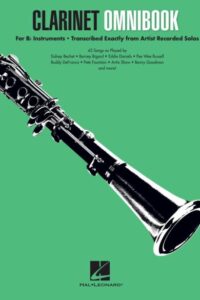 |
Clarinet Omnibook For B Flat Instruments Transcribed Exactly From Artist Recorded Solos |
| CLARINET Rare Masterpieces discovered for you by PABLO BARRAGÁN. Seltene Meisterwerke für Sie entdeckt |
 |
CLARINET Rare Masterpieces discovered for you by PABLO BARRAGÁN. Seltene Meisterwerke für Sie entdeckt |
| Clark Terry – Mack The Knife Solo |
 |
|
| Clark Terry, The Compositions of – Terry Tunes |
 |
Clark Terry, The Compositions of – Terry Tunes |
| Clark Winslow Ross 11 Short Classical Piano Pieces | Clark Winslow Ross 11 Short Classical Piano Pieces | |
| Classic Jazz Jazz Piano Solos Series Volume 22 |
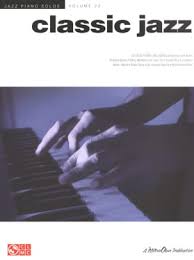 |
Classic Jazz Jazz Piano Solos Series Volume 22 |
| Classic Rock 73 Songs Piano Vocal Guitar |
 |
Classic Rock 73 Songs Piano Vocal Guitar |
| Classic Rock Fake Book (Songbook) Over 250 Great Songs of the Rock Era |
 |
Classic Rock Fake Book (Songbook) – sheet music |
| Classic Rock For Fingerstyle Guitar Tablature TABs |
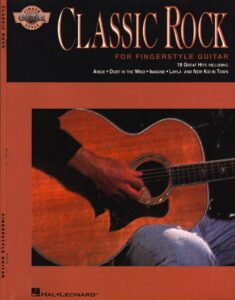 |
Classic Rock For Fingerstyle Guitar Tablature TABs |
| Classic Rock Guitar Bible 2nd Edition |
 |
Classic Rock Guitar Bible 2nd Edition |
| Classic Rock Sheet Music Hits (Easy Piano Solo) By Coates Dan |
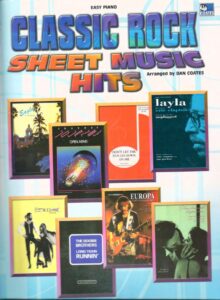 |
Classic Rock Sheet Music Hits (Easy Piano Solo) By Coates Dan |
| Classic Rock Songs In A Classical Style For Piano Solo |
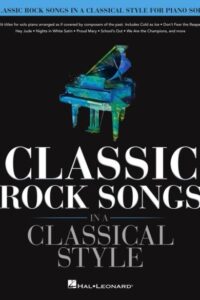 |
Classic Rock Songs In A Classical Style For Piano Solo |
| Classic Rock Songs, Most Requested (Songbook), The |
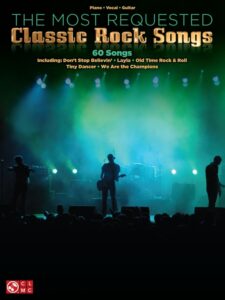 |
Classic Rock Songs, Most Requested (Songbook), The |
| Classical Carols II for the advanced Pianist – Christmas arrangements by Carolyne M. Taylor |
 |
Classical Carols II for the advanced Pianist – Carolyne ;. Taylor |
| Classical Chillout for solo piano |
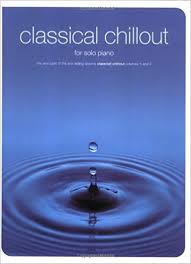 |
Classical Chillout for solo piano |
| Classical Fake Book (2nd Ed.) Over 850 classical themes and melodies |
 |
Classical Fake Book (2nd Ed.) Over 850 classical themes and melodies |
| Classical Guitar – Frederick Noad |
 |
Classical Guitar – Frederick Noad |
| Classical guitar arrangements collection vol. 1 | Classical guitar arrangements collection 12 vol. | Classical guitar arrangements collection vol. 1 |
| Classical guitar arrangements collection vol. 10 | Classical guitar arrangements collection 12 vol. | |
| Classical guitar arrangements collection vol. 11 | Classical guitar arrangements collection 12 vol. | |
| Classical guitar arrangements collection vol. 12 | Classical guitar arrangements collection 12 vol. | |
| Classical guitar arrangements collection vol. 2 | Classical guitar arrangements collection 12 vol. | |
| Classical guitar arrangements collection vol. 3 | Classical guitar arrangements collection 12 vol. | |
| Classical guitar arrangements collection vol. 4 | Classical guitar arrangements collection 12 vol. | |
| Classical guitar arrangements collection vol. 5 | Classical guitar arrangements collection 12 vol. | |
| Classical guitar arrangements collection vol. 6 | Classical guitar arrangements collection 12 vol. | |
| Classical guitar arrangements collection vol. 7 | Classical guitar arrangements collection 12 vol. | |
| Classical guitar arrangements collection vol. 8 | Classical guitar arrangements collection 12 vol. | |
| Classical guitar arrangements collection vol. 9 | Classical guitar arrangements collection 12 vol. | |
| Classical Guitar Collection | Classical Guitar Collection | |
| Classical Guitar Favorite Pieces Selected | Classical Guitar Favorite Pieces Selected | |
| Classical Guitar For Dummies (eBook) |
 |
|
| Classical Guitar Method Bradford Werner Book I |
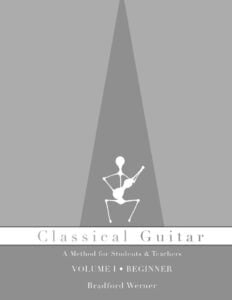 |
Classical guitar method I |
| Classical Guitar Sheet Music – Bridget Mermikides (with Tablature) |
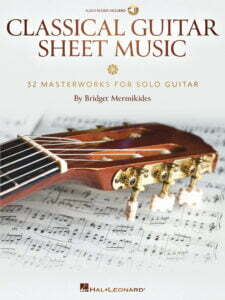 |
Classical Guitar Sheet Music – Bridget Mermikides |
| Classical Jazz – Jazz Piano Solos Series Volume 63 |
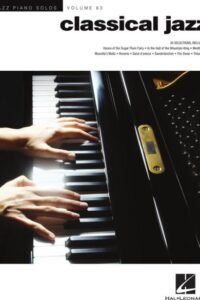 |
Classical Jazz Jazz Piano Solos Series Volume 63 |
| Classical Jazz Piano solos (The Phillip Keveren Series) |
 |
classical jazz piano solos |
| Classical Melodies The Most Beautiful Classical Melodies 46 Beautiful Melodies |
 |
Classical Melodies The Most Beautiful Classical Melodies 46 Beautiful Melodies |
| Classical Music – Eyewitness Companions (Book) |
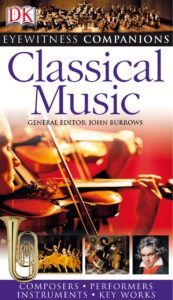 |
|
| Classical Piano Favorites (Piano Solo) |
 |
Classical Piano Favorites (Piano Solo) |
| Classical Piano Masters Early Intermediate Level 22 Pieces By 15 Composers |
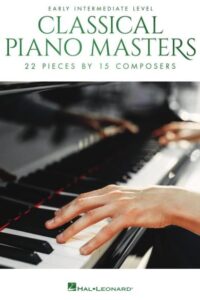 |
Classical Piano Masters Early Intermediate Level 22 Pieces By 15 Composers |
| Classical Piano Masters Intermediate Level 21 Pieces By 12 Composers |
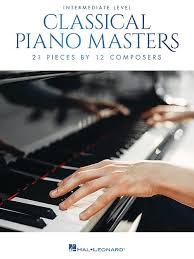 |
Classical Piano Masters Intermediate Level 21 Pieces By 12 Composers |
| Classical Piano Masters Upper Elementary Level 21 Pieces By 17 Composers |
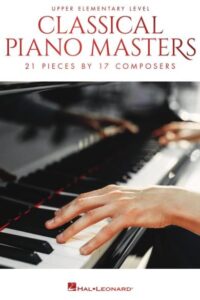 |
Classical Piano Masters Upper Elementary Level 21 Pieces By 17 Composers |
